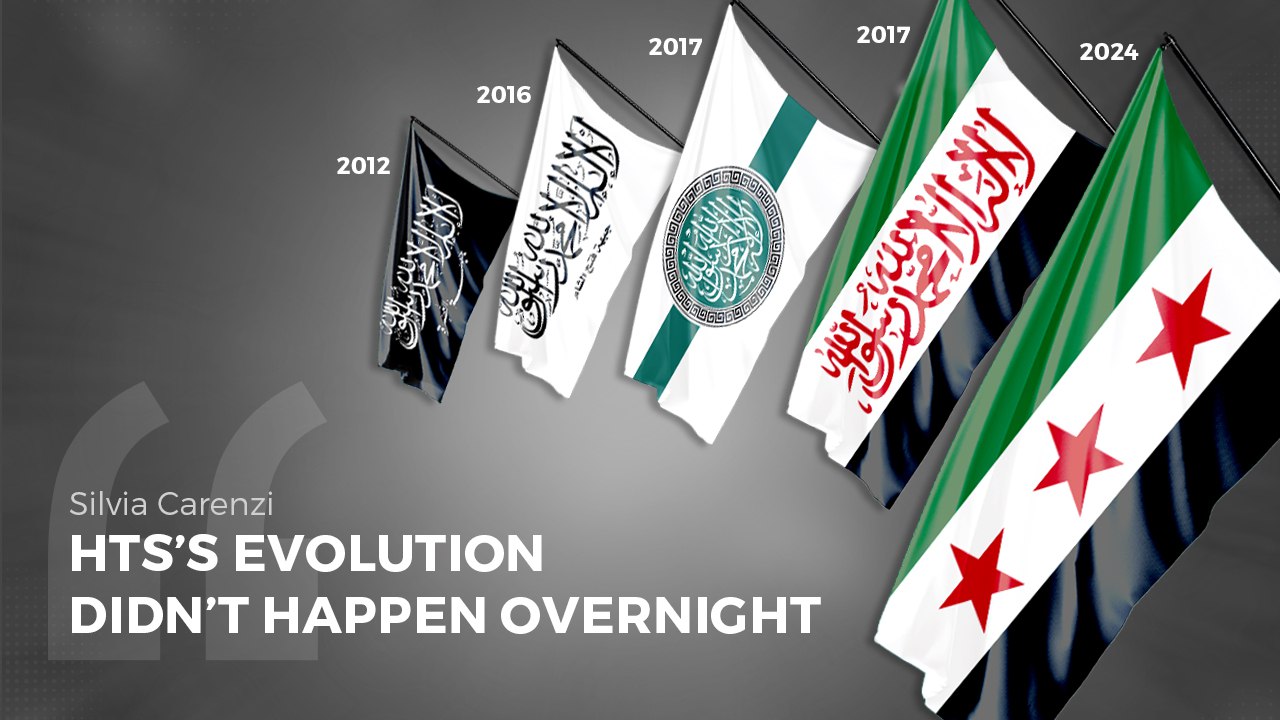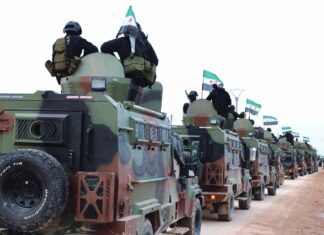
Beneath the heat of the midday sun in Eastern Ghouta, a sea of protesters surged through the dusty streets, their chants reverberating off bullet-scarred walls. “There is no terrorism in Syria except that of Assad!” read a banner carried by children at the front, their small hands clutching the pole with resolute determination. The demonstrators, linked arm-in-arm, waved the three-starred flag of the revolution, a symbol of their defiance against decades of oppression, alongside a black banner bearing the name of the group they had come out to defend.
It was December 2012, and Washington had just blacklisted Jabhat al-Nusra – a group that had become synonymous with battlefield victories against Bashar al-Assad’s forces – as a terrorist organization. “We are all al-Nusra,” proclaimed one placard, capturing the sentiment of many Syrians who saw the group not as extremists, but as defenders of their uprising. For the demonstrators, the label of “terrorist” was less about ideology and more a geopolitical maneuver, one that ignored the nuanced reality of a people’s struggle against tyranny.
12 years later Syria has experienced a dramatic transition following the collapse of the Assad regime, discussions have intensified around Hayat Tahrir al-Sham (HTS), and its origins as Jabhat al-Nusra (JN) – an acknowledged affiliate of al-Qaeda (AQ) at the time – due to its current role as a leading power in post-Assad Syria.
Ideological Evolution
The ideological shift and the potential removal of HTS from global sanctions and terror designation lists have drawn significant attention. As HTS positions itself as a key actor within the new Syrian Transitional Government (STG), its ongoing efforts to adapt and transition into a pragmatic political entity have caught the interest of international bodies. While not the first time calls for its delisting have been made, recent events have caused many to seriously consider it – including the UN and the US.
According to Dr. Silvia Carenzi, a Ph.D. in transnational governance and specializing in militant Islamism, this transformation reflects broader trends among Islamist and jihadist groups globally. “HTS’s evolution didn’t happen overnight,” Dr. Carenzi told Levant 24 (L24), emphasizing the group’s gradual break with al-Qaeda and its adoption of pragmatic governance strategies.

Unlike its predecessor, HTS has demonstrated an increased focus on localized governance, political inclusivity, and distancing itself from transnational jihadist ambitions. This shift aligns with what Dr. Carenzi calls the “Syrianization” of its ideology, as the group has sought to prioritize national over global jihadist goals, a move underscored by its counterterrorism efforts targeting groups like ISIS within its territories.
While HTS’s past as JN links it to transnational jihadism, the group has never conducted attacks against Western states, troops, or interests – either within Syria or abroad – setting it apart from other groups like ISIS or AQ. HTS’s leadership has consistently emphasized its focus on Syria and the establishment of governance within its borders.
As noted in a 2021 report by the Combating Terrorism Center at West Point, “Not only does HTS no longer represent the international terrorism threat that its predecessor once had, it has also almost entirely squashed the global threat posed by its more extreme rivals and played a role in maintaining the longest ceasefire in a decade of war in Syria.”
This evolving trajectory of HTS underscores the shifting dynamics in Syria and raises questions about the utility of maintaining its designation as a terrorist organization.
The Case for Delisting
The potential benefits of removing HTS from terror lists are multifaceted. Advocates argue that delisting the group could stabilize Syria and provide a foundation for economic recovery and international aid. The US decision to rescind a $10 million bounty on HTS leader Ahmad al-Sharaa, also known by his nom de guerre Abu Muhammad al-Jolani, signals a cautious openness to engagement. US Assistant Secretary of State Barbara Leaf described recent discussions with HTS officials as “productive” and highlighted the group’s expressed commitment to counterterrorism and inclusive governance.
Canada, Turkey, Qatar, and both the EU and UN are similarly reassessing HTS’s designation, with UN Special Envoy Geir Pedersen suggesting that a credible transitional government inclusive of all Syrian communities could pave the way for delisting. However, analysts, including Matthew Levitt of the Washington Institute, caution that such measures must be earned through concrete actions, not mere rhetoric.
Delisting, says the US, is contingent upon several criteria, inclusive governing, ensuring the rights of minorities, counter-terrorism, ensuring the unimpeded flow of humanitarian aid, and destruction of chemical weapons.
Progress & Challenges
HTS’s governance in northern Idlib has shown both promise and pitfalls. Interviews with residents reveal a nuanced picture. Father Fadi Salim Azar, a Christian priest in Latakia, shared insights into HTS’s relationship with minority communities during an interview with L24. Reflecting on the experience of monks in Idlib, Father Azar described HTS’s approach as unexpectedly supportive and respectful.
“From the moment they came, they did not commit any offense,” he said. “They came and said… we are at your service, you are under our protection, do not be afraid, we are the children of one country.’” Father Azar noted HTS’s assistance in restoring homes and ensuring religious freedoms, albeit confined to church premises. He noted HTS’s efforts to protect Christians and provide them with resources despite challenges in the region.

Ayman Al-Shoufi, a Druze journalist and writer from Suwayda, also praised HTS’s inclusive political practices, which he described to L24 as “sophisticated and creative.” He highlighted how HTS’s leadership navigated the diverse social fabric of regions like Aleppo and Damascus without imposing ideological dictates. “No minority was suppressed. The victorious party did not impose its ideological dictates on the rest of the components of the Syrian people,” Al-Shoufi explained. “As long as HTS respects and looks with high political awareness at the diversity in Syrian society, it means it is on the right path.”
Unintended Consequences
While such accounts underline HTS’s ability to foster a sense of security and coexistence among Syria’s various ethnic and religious communities, critics say HTS’s “authoritarian” governance style raises concerns. Reports of political repression, extrajudicial actions, and intolerance for dissent suggest that the group’s past commitment to inclusivity and human rights lacks consistency.
Despite arguments in favor of delisting, significant concerns remain. Critics warn that removing HTS could have unintended consequences. Skeptics argue that the group’s promises of moderation and inclusivity must be weighed against its authoritarian governance and history of repression.
Sir Keir Starmer, the UK Prime Minister, cautioned against premature decisions, stating, “We have all seen in other parts of history where we think there is a turning point – it turns out not necessarily to be the better future that we hope for. We’ve got to make sure this is different.”
Governance & Counterterrorism
However, delisting HTS would have far-reaching implications for global counterterrorism frameworks and alliances. “If HTS is delisted, it would signal a shift in the post-‘war on terror’ environment,” Carenzi noted, indicating it could even, “directly or indirectly influence other armed groups in the future.” Providing clear positive avenues of change for armed movements other than continued conflict.

For Syria, the stakes are even higher. The formation of a transitional government inclusive of all ethnic and religious groups, as advocated by the UN, is seen as essential to preventing renewed conflict and fostering long-term stability. Pedersen warned of the risks posed by sectarian divides and external meddling, urging international actors to prioritize unity and representation in Syria’s next steps.
Risks & Rewards
The delisting of HTS presents a significant opportunity to reinforce the progress it has already demonstrated toward becoming a stabilizing force in northern Syria. Over the years, HTS has distanced itself from transnational agendas, prioritized local governance, and fostered security in its territories. While ensuring continued progress on human rights and inclusivity remains essential, HTS’s demonstrated commitment to reform suggests that engagement, rather than isolation, is the most constructive approach. A phased delisting process, paired with monitoring and dialogue, would provide HTS with the time and support needed to solidify these changes, offering Syria a path toward stability, governance, and hope.








